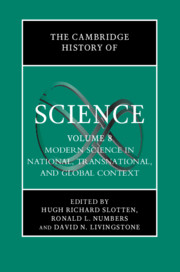Book contents
- The Cambridge History of Science
- The Cambridge History of Science
- The Cambridge History Of Science
- Copyright page
- Contents
- Notes on Contributors
- General Editors’ Preface
- 1 Introduction
- Part I Transnational, International, and Global
- Part II National and Regional
- Europe
- 11 United Kingdom
- 12 France: During the Long Nineteenth Century
- 13 France: Post-1914
- 14 Germany
- 15 Russia and the Former USSR
- 16 Low Countries
- 17 Scandinavia
- 18 Italy
- 19 Spain
- 20 Greece
- 21 Portugal
- 22 Europe: A Commentary
- Africa, the Middle East, and South Asia
- East and Southeast Asia
- United States, Canada, Australia, New Zealand, and Oceania
- Latin America
- Index
21 - Portugal
from Europe
Published online by Cambridge University Press: 21 March 2020
- The Cambridge History of Science
- The Cambridge History of Science
- The Cambridge History Of Science
- Copyright page
- Contents
- Notes on Contributors
- General Editors’ Preface
- 1 Introduction
- Part I Transnational, International, and Global
- Part II National and Regional
- Europe
- 11 United Kingdom
- 12 France: During the Long Nineteenth Century
- 13 France: Post-1914
- 14 Germany
- 15 Russia and the Former USSR
- 16 Low Countries
- 17 Scandinavia
- 18 Italy
- 19 Spain
- 20 Greece
- 21 Portugal
- 22 Europe: A Commentary
- Africa, the Middle East, and South Asia
- East and Southeast Asia
- United States, Canada, Australia, New Zealand, and Oceania
- Latin America
- Index
Summary
Portugal is a small European country located in the western part of the Iberian Peninsula with stable geographical mainland boundaries since the thirteenth century. One of the leaders of European overseas expansion during the sixteenth century, Portugal declined after 1600 while northern European states took the leadership. From the eighteenth century onwards, despite securing a large empire that included Brazil and a significant share of African territories, Portugal shifted from a center to a periphery. This particular, and even paradoxical, trajectory, from a European center to a periphery, but still keeping its centrality concerning its long-lasting empire in Africa (the last Portuguese colonies became independent in 1975), places Portugal as a privileged case study to look at the role played by science, technology, and medicine (for short science) at the national, transnational, and global levels as well as in a long-durée perspective.
- Type
- Chapter
- Information
- The Cambridge History of Science , pp. 390 - 401Publisher: Cambridge University PressPrint publication year: 2020

